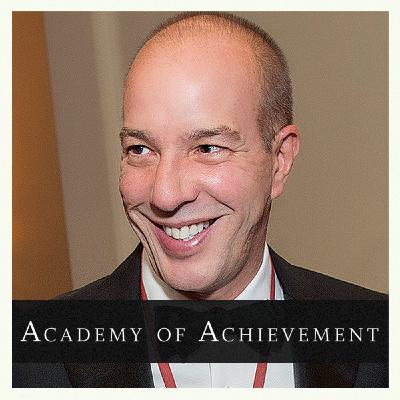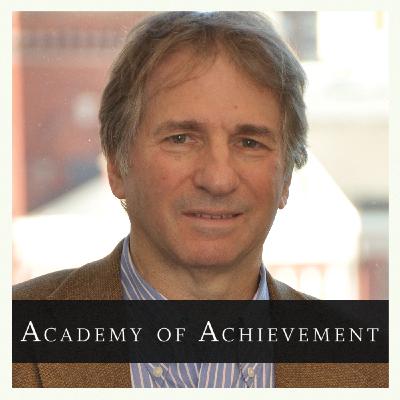Discover Public Servants
Public Servants

8 Episodes
Reverse
Anthony Romero had led the American Civil Liberties Union for only four days when the attacks of September 11, 2001 presented civil libertarians with their greatest challenge in decades. Since then, Romero and the ACLU have waged a continuous struggle in the nation's courts to ensure that the Constitution does not become a casualty of the war on terror. A son of Puerto Rican parents, and the first member of his family to graduate from high school, Romero earned law and public policy degrees at Stanford and Princeton. He is the sixth director to lead the ACLU since it was first founded, to combat the abuses of civil liberties that arose during the First World War. Anthony Romero has presided over the most explosive growth in the group's history, doubling its national staff and tripling its budget, enabling it to win significant court victories in defense of personal liberties, and restraining the warrantless surveillance of American citizens. He tells the story of this campaign in his book In Defense of Our America: The Fight for Civil Liberties in the Age of Terror. This podcast was recorded at the Auberge du Soleil in California’Äôs Napa Valley during the 2014 International Achievement Summit.
Anthony Romero had led the American Civil Liberties Union for only four days when the attacks of September 11, 2001 presented civil libertarians with their greatest challenge in decades. Since then, Romero and the ACLU have waged a continuous struggle in the nation's courts to ensure that the Constitution does not become a casualty of the war on terror. A son of Puerto Rican parents, and the first member of his family to graduate from high school, Romero earned law and public policy degrees at Stanford and Princeton. He is the sixth director to lead the ACLU since it was first founded, to combat the abuses of civil liberties that arose during the First World War. Anthony Romero has presided over the most explosive growth in the group's history, doubling its national staff and tripling its budget, enabling it to win significant court victories in defense of personal liberties, and restraining the warrantless surveillance of American citizens. He tells the story of this campaign in his book In Defense of Our America: The Fight for Civil Liberties in the Age of Terror. This podcast was recorded at the Auberge du Soleil in California’Äôs Napa Valley during the 2014 International Achievement Summit.
At age 15, Francis Collins ’Äúhad no interest in biology, or medicine, or any of those aspects of science that dealt with this messy thing called life. It just wasn't organized, and I wanted to stick with the nice pristine sciences of chemistry and physics, where everything made sense." A few years later, this farm boy from Virginia's Shenandoah Valley discovered the emerging field of DNA research and changed his whole life direction in life. Already a graduate student with a wife and child, Francis Collins completed his graduate studies in chemistry and enrolled in medical school, determined to learn if the new discoveries in molecular biology could uncover the causes of hereditary illnesses. Dr. Collins developed techniques to map and identify genes that cause human diseases including cystic fibrosis and Huntington's disease. As Director of the National Center for Human Genome Research, he led one of the largest undertakings in the history of science. By 2003, this effort had decoded the entire human genome, the first essential step to unlocking the mysteries of human heredity. In July 2009, President Obama selected Dr. Collins to serve as Director of the National Institutes of Health, the Federal government's primary agency for conducting and supporting medical research. In this podcast, recorded at the Auberge du Soleil in California’Äôs Napa Valley during the 2014 International Achievement Summit, Dr. Collins discusses issues raised by the Ebola epidemic raging in West Africa.
In today's politically charged debate over the role of the courts in American society, Justice Anthony Kennedy stands as a model of judicial temperance and objectivity. At 38, Kennedy was the youngest federal appeals judge in the country. Appointed to the Supreme Court by President Reagan in 1988, Kennedy won the unanimous approval of the United States Senate. As a Justice of the Supreme Court, he has resolutely evaluated every case on its merits, without attempting to promote an overriding political viewpoint or philosophy. Even those who disagree with his findings are compelled to admire his carefully drafted opinions. Although he has generally voted with his conservative colleagues on crime issues, he has at times sided with the Court's more liberal members on issues of free speech and privacy. His warm, unpretentious demeanor has enabled him to negotiate compromises between his fellow justices and rise above the political passions of the moment. His longtime commitment to international legal education has insured that his influence will extend far beyond his tenure on the nation's highest court. In this podcast, recorded at San Francisco City Hall during the 2014 International Achievement Summit, Justice Kennedy recalls his early career practicing law in the courtrooms that the City Hall housed when he was a young attorney.
Two of the most accomplished legal advocates in the country, David Boies and Theodore Olson met head-to-head as adversaries before the Supreme Court in the case of Bush v. Gore, which effectively decided the U.S. presidential election in the year 2000. They surprised many observers in 2009, when they joined forces to overturn California’Äôs Proposition 8, which would have banned same-sex marriage in the state. After their victory in the Supreme Court, they were jointly awarded the medal of the American Bar Association, their profession’Äôs highest honor. They have told the story of their unlikely alliance in a book, Redeeming the Dream. In this podcast, recorded at the 2014 International Achievement Summit in San Francisco, David Boies and Theodore Olson describe their experience as adversaries in Bush v. Gore, and as allies in the historic gay marriage case.
Two of the most accomplished legal advocates in the country, David Boies and Theodore Olson met head-to-head as adversaries before the Supreme Court in the case of Bush v. Gore, which effectively decided the U.S. presidential election in the year 2000. They surprised many observers in 2009, when they joined forces to overturn California’Äôs Proposition 8, which would have banned same-sex marriage in the state. After their victory in the Supreme Court, they were jointly awarded the medal of the American Bar Association, their profession’Äôs highest honor. They have told the story of their unlikely alliance in a book, Redeeming the Dream. In this podcast, recorded at the 2014 International Achievement Summit in San Francisco, David Boies and Theodore Olson describe their experience as adversaries in Bush v. Gore, and as allies in the historic gay marriage case.
Barry Scheck has been honored as the most outstanding criminal defense lawyer in America. A pioneer of the use of DNA evidence, he co-founded the Innocence Project at Cardozo Law School in New York City. In the past decade, the Project has helped secure the exoneration of more than 200 men previously convicted of crimes they did not commit, many of whom would have faced execution but for the intervention of Scheck and his associates. He describes many of these cases in his book, Actual Innocence: Five Days to Execution and Other Dispatches From the Wrongly Convicted. Scheck may be best known to the American public as the DNA expert on the O.J. Simpson defense team, an occasion he saw as an opportunity to promote higher standards in the handling of DNA evidence. He has frequently served as an expert advisor to law enforcement agencies, including the FBI, and has assisted in the investigation of unsolved crimes such as the JonBenet Ramsey murder. He has served as counsel in numerous civil and criminal actions involving the rights of battered women and incidents of police brutality, including the Abner Louima police assault incident in New York. He co-founded the Innocence Project after six years of litigation to establish standards for the use of DNA evidence in U.S. courts. In this two-part podcast, recorded at the 2014 International Achievement Summit in San Francisco, he discusses his work as founder of the Innocence project, his long campaign to inject DNA evidence into the legal system, and the resulting exoneration of innocent men and women wrongly convicted of violent crimes.
Fashion Designer










